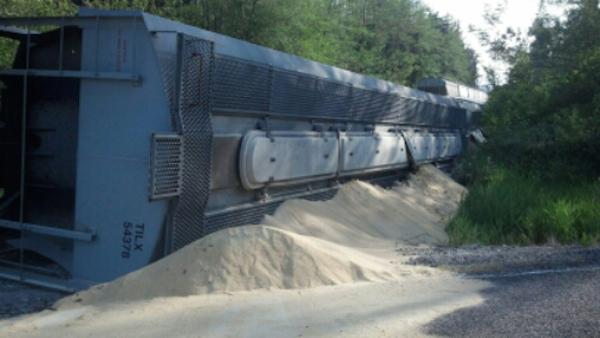It has happened again, this time not with oil but with grain.
However, the Quinault Nation pointed out on May 16, the derailment of a grain train in Grays Harbor County is all the affirmation needed to show that transporting something more hazardous, namely oil, in this manner has too much chance of ending badly.
“Another train derailment in Grays Harbor County? Three in three weeks? Rails ripped up, Cars tipped over. Cargo spilled out,” said Quinault Indian Nation President Fawn Sharp in a statement. “That cargo may have been grain this morning, but it might just as well have been oil, and that would have been disastrous.”
Sharp was alluding to a May 15 incident in which seven cars carrying grain tipped over when 11 cars on the train they were part of derailed. It was the third such occurrence in as many weeks on the network of tracks operated by Puget Sound & Pacific Railway in the Grays Harbor area, the Quinault statement said. This came right on the heels of two earlier derailments—one on April 29, when a grain car tipped over in Aberdeen, and another on May 9 in east Aberdeen, when some cars came off their tracks, the Quinault said.
The cargo was different, but the propensity of train cars to derail no matter what they were carrying says that transporting oil via this method is not safe, the Quinault said. Around the country and in Canada, derailments of trains bearing crude oil, much of it from oil sands and deemed especially flammable, have resulted in destruction and even death.
RELATED: Exploded Quebec Oil Train Was Bringing Crude From North Dakota’s Bakken to New Brunswick Refineries
Lynchburg Oil Train Explosion Refuels Rail-Terminal Opposition in Northwest
However, Puget Sound & Pacific Railway, a division of Genessee & Wyoming, said it was investigating the cause of the derailment.
“This series of minor derailments is a highly unusual, unacceptable occurrence and subject to a rigorous investigation,” company spokesperson Michael Williams, Genesee & Wyoming, told radio station KXRO on May 16. “The first two derailments were caused by localized failure of railroad ties that were saturated with moisture from recent heavy rains. Other locations experiencing this issue have been identified and are being corrected prior to receiving another train. The cause of yesterday’s derailment is still being determined.”
Several tribes in the Northwest are opposing railroad terminals in or near their territory that would handle oil and coal. Oil traffic in particular has troubled the Quinault.
“Now, one-two-three, it’s as easy as that. Any argument in favor of bringing Big Oil into our region has been knocked out cold,” said Sharp in the statement. “As we have consistently stated, our people and our treaty-protected natural resources are jeopardized by these oil shipments. This danger is real. We have invested millions of dollars to protect and restore the ecological integrity of our region, and we will not allow Big Oil to destroy it.”
Read more at http://indiancountrytodaymedianetwork.com/2014/05/19/grain-car-derailment-could-have-been-oil-quinault-raise-alarm-again-154940

